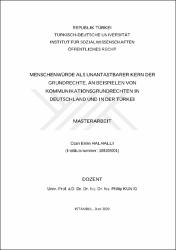Menschenwürde als unantastbarer kern der grundrechte, an beispielen von kommunikationsgrundrechten in Deutschland und in der Türkei
Özet
Alman Anayasası madde 79 fıkra 3 düzenlemesi uyarınca Alman Anayasası madde 1 fıkra 1 düzenlemesi normatif olarak özel ve değiştirilemez bir temel haktır. Diğer yandan insan onuru Alman Anayasası madde 19 fıkra 2 uyarınca temel hakların dokunulmaz çekirdeği olarak bir anayasal prensip olarak vurgulanabilir. İnsan onurunun dokunulmazlığı, normun değiştirilemezliği ve insan onurunun farklı açılardan ifade edilişi onu "özel" bir düzenleme haline getirmektedir. Bu çalışmayla insan onurunun "özel" yapısını diğer temel haklardan ayırıyoruz. İnsan onuru ile diğer temel haklar arasındaki ilişkiyi temel iletişim hakları örneklemi ile ele almayı hedefledik. İnsan onurunun bu özel yapısı anayasada yazılı olarak yer almalı mıdır, bunu da ele almaya çalıştık. Bu noktada Türk ve Alman anayasalarını karşılaştırdık. According to Article 79 (3) of the Basic Law (Grundgesetz), the normative status of Article 1 (1) of the Basic Law as the only "special" fundamental right cannot be changed. Furthermore, human dignity within the meaning of Article 19 (2) of the Basic Law as the inviolable core of constitutional rights can be emphasized as a constitutive principle. The guarantee of eternity, the inviolability and the expression of human dignity in its various dimensions constitute Article 1 (1) of the Basic Law as a "special" article. In this thesis, we distinguish this "special" structure of human dignity from other fundamental rights. The objective is to examine the proportion between human dignity and fundamental rights with regard to communication rights. I have tried to examine whether the "special" structure of human dignity must necessarily be found in written constitutional laws. At this point, we compare the Turkish and German constitutions as examples.
Koleksiyonlar
- Tez Koleksiyonu [13]

















